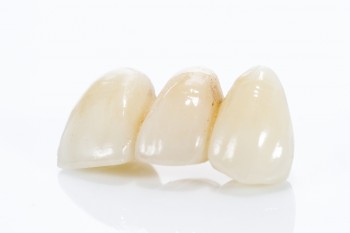Broken or Chipped Tooth

Teeth can chip or break due to a variety of reasons. Not only do these teeth cause an aesthetic concern, they can also irritate your tongue, be painful, or impossible to chew with.
What To Do
If you’ve broken or chipped a tooth, call your dentist to see how quickly you can be seen. You may even have a portion of the fractured tooth that you’ve been able find. These pieces should be placed in a cup of water or milk to stay moisturized until you can get to the dentist within a short time. Do not attempt to clean the fragment off, as this can make it difficult for your dentist to re-bond it to the tooth (should that be an option.)
Depending on the severity of the fracture, your dentist may recommend:
- Bonding the fractured portion of the tooth back in place.
- Filling the area with tooth-colored restorative material
- Correcting appearance of the tooth with a veneer
- Placing a full coverage crown over the tooth
- Tooth recontouring
What to Do
Teeth can break or chip from a variety of conditions. Common causes of broken teeth include:
- Underlying damage to the enamel
- Accidental trauma
- Brittle, non-vital teeth caused by nerve damaged
- Untreated tooth decay
- Old, failing fillings that have come loose or broken
- New development of tooth decay
- Chewing hard items
- Grinding or clenching of the teeth
Risks Of Not Treating
Not repairing a broken tooth can allow bacteria and external factors to target the weaker, interior portion of the tooth. This portion of tooth called dentin is much more susceptible to tooth decay. Not only can decay form quickly, it can also spread right through the dentin and into the nerve tissue of the tooth. The tooth could then need treatments such as a root canal in order to keep it healthy.
- As teeth break, the weakened portion can easily wear down or crumble apart even more during everyday use. Gradually an area that requires a small filling or bonding can become a tooth that requires a full coverage crown.
- Other dental restorations may wear out or break down due to an irregular bite or chronic grinding. Enamel is the hardest structure in the body, but neither teeth nor existing filling materials can withstand constant grinding habits that put more force on the tooth than normal.
- Treatments for broken, chipped teeth aren’t just for aesthetics. They’re also for making sure your smile can function the way it should. The longer treatment is put off, the more expensive it can become to treat it.
Benefits Of Treating
Early dental care typically means that your dentist is able to offer you a wider variety of treatment options, as well as treatments that fit just about any budget! Smaller treatment cases take less time to complete and also help you avoid possible discomfort caused by a more severe problem later on.
Treating a broken or chipped tooth can also help you prevent future damage from happening. Your dentist can pinpoint other areas that are likely to suffer from the same condition, caused by weak enamel or various risk factors. If the injury was sustained from an athletic activity or night-time grinding, then your dentist might recommend making a custom-fitted guard to prevent further wear or fractures.
Alternative Treatments
Fractured teeth typically have a wide variety of treatment options, depending on the severity of the fracture:
Bonding – Tooth colored bonding material can correct the appearance of teeth that are broken, as well as protect underlying tooth structure.
Veneer – Dental veneers cover the front of a tooth and re-create the appearance of a perfectly straight, white tooth. Veneers can be placed even on undamaged, natural teeth to create a beautiful smile.
Crown – Deep chips or cracks can compromise the integrity of a tooth, making it break down even more over time. Full coverage crowns protect brittle or severely damaged tooth structure so that it continue functioning as normal.
Splint / Guard – If chronic grinding (bruxism) or sporting activities put you at risk for worn or fractured teeth, having a custom made guard can prevent more damage from taking place. These guards and splints are comfortable to wear and will stay in place without having to worry about them getting in the way or falling out.
Why go another day with a broken or chipped tooth? If your tooth hurts or simply keeps you from smiling, then it’s time to see a dentist.


